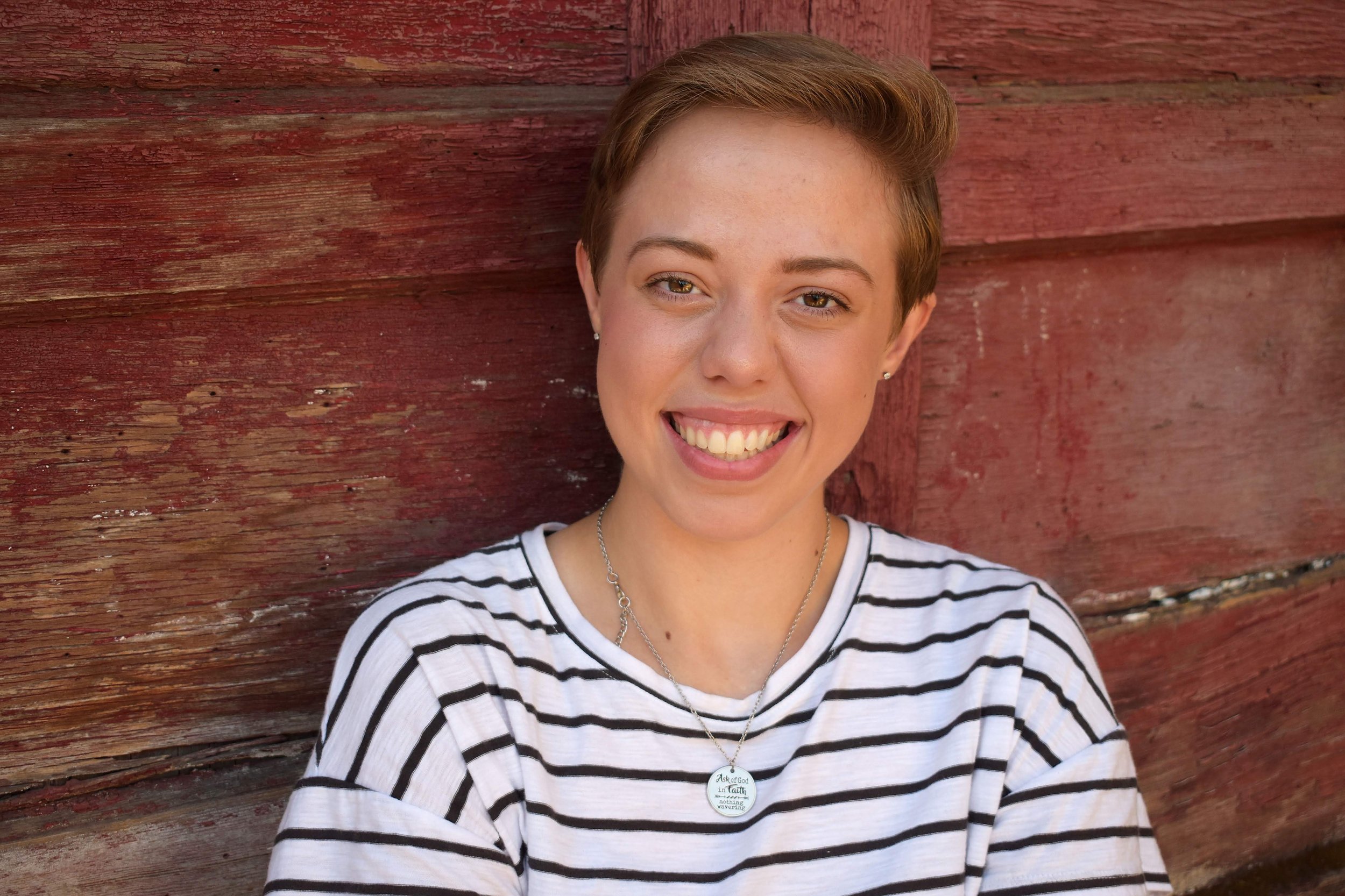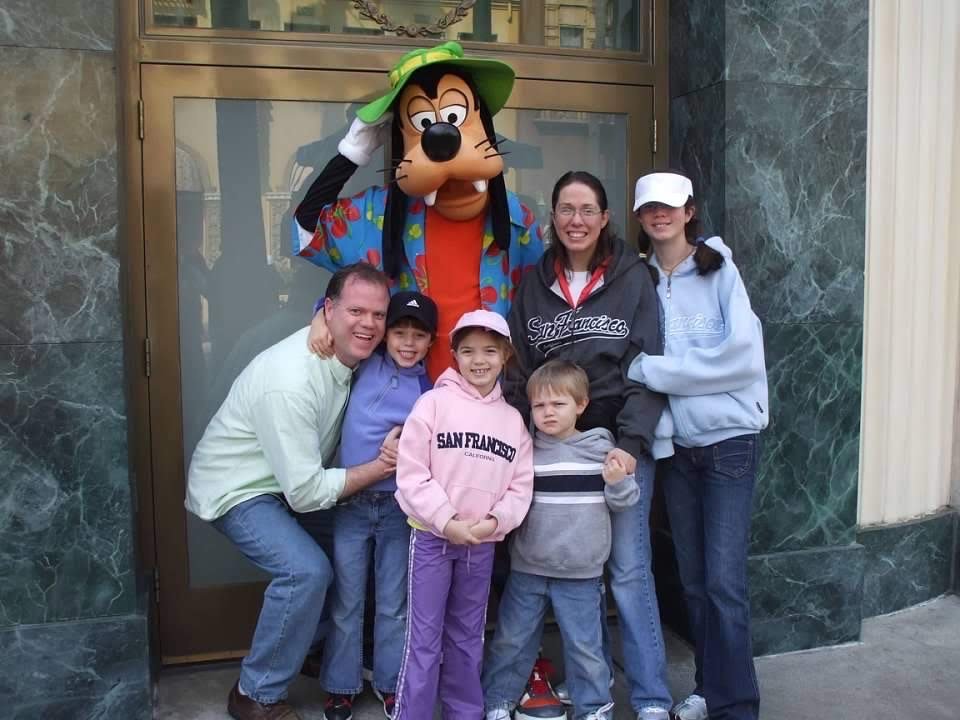Growing up in Washington State, Katelyn Oliver enjoyed a childhood filled with adventure and exploration. Her hometown of Snohomish is bigger now than it used to be, and Katelyn loved living so close to the beach mountains, desert, and Canada. Youth trips often involved hiking and camping, and weekend family time included jaunts to the San Juan Islands off the Washington peninsula. While there was always a lot to see and do near home, Katelyn’s parents’ Christmas gifts to their four kids were often travel experiences. These trips included visits to Europe, Washington D.C., Arkansas, Utah and Hawaii, and fostered an openness to different cultures and perspectives. “I never felt like I was living in a bubble. For us, it was important to meet different people and have that exposure.” Katelyn says she was “a double minority in Washington – gay and a member of the church.” But growing up in a diverse community with friends of all denominations and persuasions, Katelyn never felt the need to tell others they needed to join her church. “We all thought of each other as good people, and had a lot of fun together.”
Now a 23-year-old student at Utah Valley University studying social work and minoring in Brazilian Portuguese, Katelyn says she realized she had crushes on girls from a young age but lacked the vocabulary to express it. A moment of clarity came when she visited her uncle in California and met his partner. Around the age of 10 at the time, she recalls, "I saw them give a kiss goodbye and was like, ‘Oh my gosh, that’s crazy’!" Her father later pulled her into the subway and explained, "So, your uncle is gay…" At that moment, Katelyn had the thought, "Oh, that’s me!" This was a conversation she now understands her parents had been prepared for, suspecting that she might eventually reveal something to them about her own gender or orientation.
As she navigated middle school, Katelyn struggled with the gender binaries that seemed to divide the boys from girls when it came to hanging out, and she always preferred to cut her hair short as a kid. She often expressed disdain at home for losing friends over these things. Navigating her identity within the church she loved could also be complicated, although church was still her favorite place, with most of her closest friends being members of her ward and stake. Katelyn frequently felt a sense of anxiety when approaching her bishop interviews, particularly when asked about supporting any groups or ideologies contrary to church doctrine, because of her strong desire to be honest, which has remained an important value of hers. When she was 15, she brought up a hypothetical, “What if someone was having these kinds of feelings…” to her bishop, a close family friend. He reassured her that, "If you don’t act on it, you’re okay – it’s not a sin. Just having an attraction is okay." This validation lifted a weight off Katelyn’s shoulders, but she continued to keep her feelings private for some time.
The challenges of being openly queer in a church setting quickly became evident at a youth girls’camp when a friend confided with others that she was questioning her sexuality. Another camper overheard and reported it to a leader, leading to the girl being sent home early. Katelyn was deeply upset, and expressed to her mom when she went home from camp that this was why people left the church—that leaders had been so unkind, they basically sent the girl away. "I was so mad because of course, I’m gay and had known." Katelyn’s mom responded, "If it was you, Katelyn, how would you want us to react?" Katelyn replied that she wouldn’t want her parents to change a thing because she was still the same person she’d always been. Later that night, Katelyn texted her mother, asking her to come into her room. "I told her first. I just said, 'I like girls’.” Katelyn’s dad then came in and they both reacted well, having had experience with her uncle. While supportive, the Olivers initially assumed Katelyn was bisexual. It wasn’t until later that she clarified, "No, I’m not bi. It’s 100%." This revelation to her parents and siblings led to months of conversations within her family, with periods of talking about it and then not so much until Katelyn turned 18 and started to tell her close friends. It became refreshing when she finally reached out to a few queer teens from her stake with whom she could really open up. “I started hanging out with queer people for the first time, and got my first playlist of queer music. They were like, ‘You haven’t listened to Girl in Red or Fletcher?’ It was so fun to be around people like me in this one area and be able to talk without a filter.” Katelyn also was able to get together with Ben Schilaty who was from her same stake, and she appreciated the seasoned advice from someone who had been on a mission and experienced similar things.
Deciding to serve a mission herself was one thing Katelyn had always wanted to do, though the reality of it was fraught with anxiety as she wasn’t exactly sure how she would navigate her feelings and be herself. A missionary during COVID, Katelyn was called to the Brazil Brasilia mission but began her service in the Fort Collins, CO mission (serving in Nebraska for six months) due to visa delays. Adjusting to missionary life while grappling with her identity was challenging. "I felt so disconnected and alone," she admits. With encouragement, she confided in her sister training leader (who told her she had never met a gay person before) and later her companion, who responded with tears and unconditional support. "I’m here to take care of you, on your side, here to protect you," her companion replied. Katelyn learned that companion’s best friend back home was also gay, and she had sensed Katelyn had something to share. That reassurance changed everything, and gave Katelyn an easier workaround when there were parts of lessons she didn’t feel comfortable teaching. "It made being able to teach people so much easier – to have someone on my side willing to adjust things with me." After opening up to her companion and making adjustments with how they shared their messages, Katelyn felt she could really feel the spirit when she talked about the Savior.
When she finally arrived in Brazil, Katelyn’s transition proved difficult. Isolated as one of only five American missionaries at the time, she struggled with the language barrier. "For four months, I couldn’t understand them, and they couldn’t understand me." Once she became fluent, things improved, but her relationship with her third mission president became strained. Unlike her two previous mission leaders who she describes as “wonderfully loving” and who had felt prompted about Katelyn’s need to be paired up with someone who would be friendly to a queer person, the new leader had a rigid, numbers-driven approach and a general resistance to anyone nonconforming. In their final interview, he questioned her about cutting her hair and then told her, "I know you’re gay, but if you don’t go home and marry a man in the next six months, you will lose your inheritance in the kingdom of God and destroy your family." He then handed her a certificate and sent her home. Returning from her mission left Katelyn with conflicting emotions. "The mission played a part in where I’m currently at – it showed me what I truly believe. I believe in Jesus Christ. We can never be Him, but He can make us the best version of us we can be. That doesn’t mean I have to deny myself or every part of me that makes me me.” Katelyn also says, “I believe that families are together forever, not that they 'can be’." However, she describes her relationship with the church as iffy. "For me, the LDS church isn’t the biggest focus when it comes to my relationship with God. I’m open to seeing where the future takes me."
Now at UVU, Katelyn is building a life in a way that aligns with her authentic self. She works at the university’s outdoor adventure center, leading camping and skiing trips, and enjoys spending time with her girlfriend. Twice a month, they attend gatherings with other queer Latter-day Saints. "They’re not 100% church-centered, but a good 'how are you doing' check-in. We are there to support each other," she says. Katelyn continues to reflect on her experiences and what they mean for her personal and spiritual development. "There’s a lot of fear in the community about stepping away or questioning," she says. "But I’ve learned that it’s okay to change your path. It’s okay to take breaks and explore what truly brings you peace." Her advice for others navigating similar experiences is simple: "Don’t be so hard on yourself. Regardless of what happens, you’re always capable of changing your course. If you feel you want to try something new, or step away, it doesn’t mean you’ll never come back. You can always change your life. There doesn’t have to be this weight of 'Oh no, if I do this, the consequences if I’m wrong are too grave.' Just be willing to go after the things you want and be kinder to yourself."
























